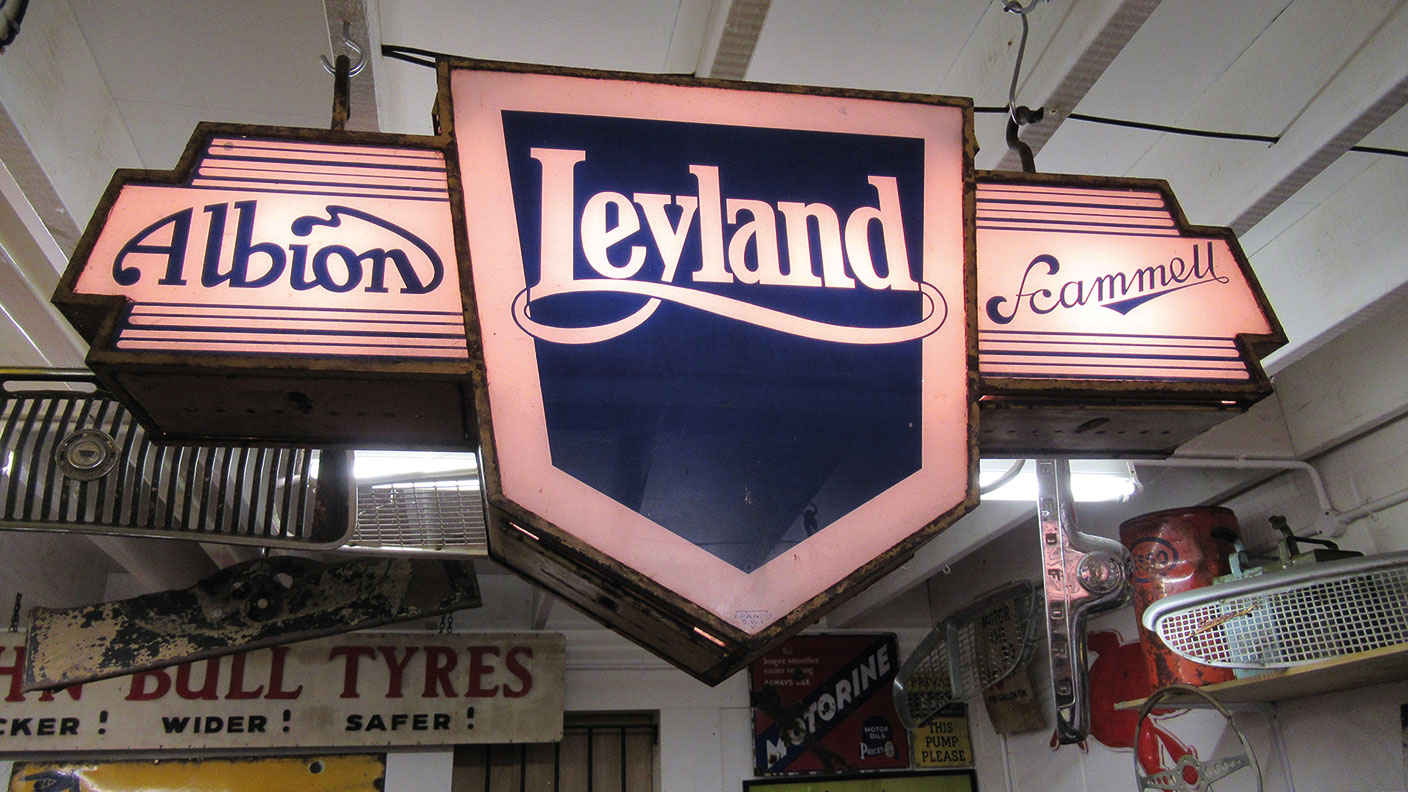Whisk yourself away to better times with transport memorabilia
Nostalgia is driving a boom in transport memorabilia, including tube train luggage racks and illuminated garage signs. Chris Carter reports.


Get the latest financial news, insights and expert analysis from our award-winning MoneyWeek team, to help you understand what really matters when it comes to your finances.
You are now subscribed
Your newsletter sign-up was successful
Want to add more newsletters?

Twice daily
MoneyWeek
Get the latest financial news, insights and expert analysis from our award-winning MoneyWeek team, to help you understand what really matters when it comes to your finances.

Four times a week
Look After My Bills
Sign up to our free money-saving newsletter, filled with the latest news and expert advice to help you find the best tips and deals for managing your bills. Start saving today!
For those of us fortunate enough to be able to work from home, successive weeks of lockdown almost makes one nostalgic for the daily commute to the office. Almost. But it does also offer up at least one explanation for the growing popularity of transport memorabilia. “Collectors have gone wild for parts salvaged from decommissioned Tube trains, with goods ranging from seat fabric, station tiles and phone handsets,” says Rory Tingle for MailOnline. Sales of Metropolitan Line luggage racks from the Sixties, for example, have generated hundreds of thousands of pounds for the London Transport Museum. Lift buttons, bizarrely, are apparently especially popular.
Since the museum comes under Transport for London’s direction, it is free to keep or sell any old items that come into its hands – a lucrative revenue source, as it turns out. According to MailOnline, the museum has, over the years, sold 1,053 Jubilee Line lift buttons for a total of £26,325, eight Overground train drivers’ seats at £375 a pop and 3,554 Metropolitan Line luggage racks for £355,500.
Driving the market
It’s not just trains. “The market [in automobilia] is showing no signs of slowing, and items which might have been £50 or so a couple of years ago are now making around £250,” says collector Stewart Imber, who runs a business, Themed Garages, dressing sets for motoring events, such as the Goodwood Revival. In October he sold part of his collection through Cambridge-based auction house Cheffins. “Illuminated signs are now really coming into their own as part of the vintage sale,” says Cheffins’s director, Jeremy Curzon. And yet, “despite their meteoric rise in popularity, illuminated signs can still be picked up at a good price at auction and we see many buyers coming to the sales looking to pick up a bargain”.
MoneyWeek
Subscribe to MoneyWeek today and get your first six magazine issues absolutely FREE

Sign up to Money Morning
Don't miss the latest investment and personal finances news, market analysis, plus money-saving tips with our free twice-daily newsletter
Don't miss the latest investment and personal finances news, market analysis, plus money-saving tips with our free twice-daily newsletter
“Upcycling” memorabilia
British Airways indulged plane enthusiasts in November with a sale of its surplus stock. William Edwards plates were on sale for £25, bread baskets for £42 and hot towels for £12 each. In fact, such was demand that some customers complained of delivery delays. Sensing a trick, the airline has even launched a range of 150 limited edition BOAC Speedbird suitcases this month, each made with bits of an old Boeing 747 and costing £1,935 apiece.
But it’s best to wait for transport items to be decommissioned first. Earlier in January, one fashion student ran into trouble with clothes sales platform Depop after refashioning and selling a Chiltern Railways seat cover cum bandeau top. She sold it for £15 before refunding the money and delisting the item. Chiltern Railways was not amused. “Whilst we appreciate this new take on railway memorabilia,” a spokesperson said, “…we would respectfully ask that they are left in place.”
Auctions

Going…
Film posters, memorabilia and toys are going under the hammer at Van Eaton Galleries, in California, as part of its A Celebration of Popular Culture sale on 30 and 31 January. A poster from the 1954 classic Creature from the Black Lagoon is expected to sell for up to $30,000 and an “exceptionally rare” life-size replica of Rocket Racoon from Marvel’s Guardians of the Galaxy has been given an upper estimate of $50,000. Among the toys for sale is a Batman Utility Belt from 1966 that is valued at up to $10,000.
Gone…
The first comic to feature Batman in its title has fetched a record $2.22m, “far and away the highest price ever realised for a comic book starring Bruce Wayne and his caped-and-cowled alter ego”, says Texas-based Heritage Auctions. The No.1 issue is the sole copy to receive a 9.4 grade (out of ten) for its condition. The record was reached after online bidding surpassed $1.53m with a week still to go. The 1940 issue of Batman also features the debuts of villains the Joker and Catwoman.
Get the latest financial news, insights and expert analysis from our award-winning MoneyWeek team, to help you understand what really matters when it comes to your finances.

-
 Can mining stocks deliver golden gains?
Can mining stocks deliver golden gains?With gold and silver prices having outperformed the stock markets last year, mining stocks can be an effective, if volatile, means of gaining exposure
-
 8 ways the ‘sandwich generation’ can protect wealth
8 ways the ‘sandwich generation’ can protect wealthPeople squeezed between caring for ageing parents and adult children or younger grandchildren – known as the ‘sandwich generation’ – are at risk of neglecting their own financial planning. Here’s how to protect yourself and your loved ones’ wealth.
-
 Three key winners from the AI boom and beyond
Three key winners from the AI boom and beyondJames Harries of the Trojan Global Income Fund picks three promising stocks that transcend the hype of the AI boom
-
 RTX Corporation is a strong player in a growth market
RTX Corporation is a strong player in a growth marketRTX Corporation’s order backlog means investors can look forward to years of rising profits
-
 Profit from MSCI – the backbone of finance
Profit from MSCI – the backbone of financeAs an index provider, MSCI is a key part of the global financial system. Its shares look cheap
-
 'AI is the real deal – it will change our world in more ways than we can imagine'
'AI is the real deal – it will change our world in more ways than we can imagine'Interview Rob Arnott of Research Affiliates talks to Andrew Van Sickle about the AI bubble, the impact of tariffs on inflation and the outlook for gold and China
-
 Should investors join the rush for venture-capital trusts?
Should investors join the rush for venture-capital trusts?Opinion Investors hoping to buy into venture-capital trusts before the end of the tax year may need to move quickly, says David Prosser
-
 Food and drinks giants seek an image makeover – here's what they're doing
Food and drinks giants seek an image makeover – here's what they're doingThe global food and drink industry is having to change pace to retain its famous appeal for defensive investors. Who will be the winners?
-
 Barings Emerging Europe trust bounces back from Russia woes
Barings Emerging Europe trust bounces back from Russia woesBarings Emerging Europe trust has added the Middle East and Africa to its mandate, delivering a strong recovery, says Max King
-
 How a dovish Federal Reserve could affect you
How a dovish Federal Reserve could affect youTrump’s pick for the US Federal Reserve is not so much of a yes-man as his rival, but interest rates will still come down quickly, says Cris Sholto Heaton